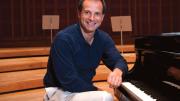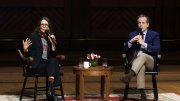“I don’t believe classical music is dying,” says Federico Cortese, the new conductor of the Harvard-Radcliffe Orchestra, “but I do believe there is a risk of becoming too aloof from the rest of the world.” Since 1999, as director of the Boston Youth Symphony Orchestras, he has relished that “refreshing, exciting, energetic, rewarding” work with young people, who nicknamed him “the Fed.” Cortese has also conducted all over the world. As assistant conductor of the Boston Symphony Orchestra under Seiji Ozawa from 1998 until 2002, he once, on short notice, directed Beethoven’s Ninth for more than 100,000 people on Boston Common. Of Neapolitan extraction, Cortese grew up in Rome in a cultured family: his father is a professor of medieval history and law, his mother an antiques expert. At age five, Cortese joined a boys’ choir, then learned recorder, flute, piano, and oboe, training at the Conservatorio di Santa Cecilia in Rome, where he also studied voice, composition, and conducting. From 17 to 23, he sang early music as a professional baritone and countertenor who could also sing tenor parts, a rarity. He later studied conducting at the Hochschule für Musik in Vienna, and also learned over the years from several great maestros: Herbert von Karajan, for example, granted him full access for two years to all Salzburg Festival rehearsals and performances. “Conducting,” Cortese says, “is something you learn through osmosis.” Important challenges, he feels, are connecting music with the larger intellectual environment and “getting the sounds you want from an orchestra,” he says, smiling. “You know, it’s not a computer.”
Federico Cortese is the new conductor of the Harvard-Radcliffe Orchestra
Federico Cortese is the new conductor of the Harvard-Radcliffe Orchestra
Meet the new conductor of the Harvard-Radcliffe Orchestra.

You might also like
Harvard’s Hasty Pudding Honors Rose Byrne
The Bridesmaids actress celebrated her 2026 Woman of the Year Award with a roast and a parade.
Rabbi, Drag Queen, Film Star
Sabbath Queen, a new documentary, follows one man’s quest to make Judaism more expansive.
Tina Fey and Robert Carlock Talk Collaboration, Joke-Building at Harvard
The duo behind 30 Rock and Unbreakable Kimmy Schmidt shared insights as part of the Learning from Performers series.
Most popular
Explore More From Current Issue

These Harvard Mountaineers Braved Denali’s Wall of Ice
John Graham’s Denali Diary documents a dangerous and historic climb.







